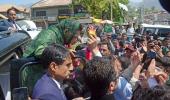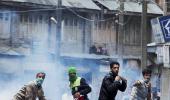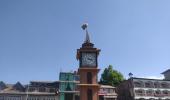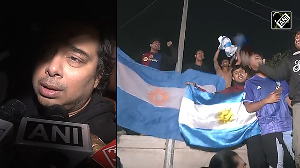It's just not about selecting a candidate. It's not about helping some candidate win.
It's about expressing emotion, after ten years, that could reach out to larger India and beyond it, notes Sheela Bhatt from Srinagar.

The Kashmir Valley is all set to break its silence. The Lok Sabha election 2024 has acquired a completely different meaning in the land of dissent.
The Kashmiri people who have slipped into silence since August 5, 2019 when Article 370 was abrogated are talking, debating and trying to make up their minds to press the button of the EVMs.
This election is the Kashmiris' 'to be or not to be' moment.
If they participate in this election they know the Indian democratic process will move further in Kashmir.
If they boycott voting they know they will lose the chance to take their voice outside the Valley.
This time people are seen excited to vote. Jammu and Kashmir, the Union Territory, has five Lok Sabha seats. Three of them are in the Kashmir Valley. The election in Srinagar, Anantnag in south Kashmir and Baramulla in north Kashmir will be held in different phases.
If the voting in the Kashmir Valley's three seats remains above 30%/35% it will be an achievement of all stakeholders.
In the past, the voting percentages in Srinagar have remained around 14.4% or less -- that too 'pushed' by the security forces.

Srinagar will vote on May 13.
It's just not a date. It's just not about selecting a candidate. It's not about helping some candidate win. It's about expressing emotion, after ten years, that could reach out to larger India and beyond it.
This is the encouraging development in a long, long, time. This election in Kashmir is unique, also because neither the Congress nor the BJP have put up candidates here. In the absence of the national parties the election is about finding the son/daughter of the soil who can represent Kashmiris well in New Delhi.
Also, no separatists or insurgent groups have asked Kashmiris to boycott the election which was the normal practice for many decades.
Pakistan's overt or covert presence is minimal. The threat from Pakistan-based terror groups has not been heard, yet.
The secret cells of terrorists groups are, largely, "passive" in the Valley at this time with heavy security deployment due to the election and the coming Amarnath Yatra.
Wani (name changed), a shopkeeper in downtown Srinagar, tries to explain his predicament. "We have passed through unimaginable pain. In 2019, we were angry about revoking Article 370. What will be our identity without Article 370? Our land is now not safe. All kinds of people will migrate to the Valley.
"We will be no more Kashmiris. However, after five years we have understood it's a fait accompli. We have absorbed the bitter pill," Wani concedes.
With a smirk, he adds, "It's not that everything has gone wrong since 2019. We are reluctant to accept that things are normal and our women and children are safer."
"But, why reluctance?" I ask.
"We never read Article 370. We knew nothing about it. But we knew we were special," he grumbles.
"Kashmir has a special status, guaranteed by the Indian Constitution. More than its abrogation we feel betrayed by the way India did it. Why did you not take us into confidence? We have a problem with the way it was done," he says.
This is the crux of the problem in Kashmir on election eve.

A senior professor at a local college explains the mental turbulence further: "Whatever has happened has happened. You live with what you get. No choices have been given. There were lots of silences."
In the last five years, the professor tells me, Kashmiris haven't been openly debating the consequences of revoking Article 370. "This Lok Sabha election is very important. The silence will be broken," he says.
There is a perceptible change in Kashmir. Common men and women have settled into a life of routine. The security situation has improved.
Unfortunately, the restraint on the local media continues, but YouTube and WhatsApp gives Kashmiris news and views, uninterrupted.
The families belonging to the tourism related industry feel relief due to the influx of tourists and the incomes the visitors generate. There are many more bridges and road connectivity.
In the cities and towns traffic jams are common. Many more beauty parlours, coffee kiosks, tuition schools and malls are visible. The health and educational institutes work as normally as they do in Lucknow or Chandigarh.
Most important is an unwritten diktat of the UT administration to the military, paramilitary forces and to the Jammu and Kashmir police to "not disturb" the common men and women, but go after the insurgents as brutally as they can.
"People are less angry about India," says a Srinagar-based analyst who has written a lot about Kashmir, "but they are incensed with the BJP. The BJP is the target of their fury. Whatever their leaders speak about Muslims outside Kashmir affects us."
Many Kashmiris in Srinagar and Pulwama tell me that this is the first election under the shadow of Article 370, but it's NOT the real issue here.
The anger against the BJP and unemployment amongst the youth are two real issues.
The BJP is present in its absence. This is quite an interesting political development.

"We have more or less accepted that Article 370 will never return," a lady working at a mall tells me, "We are equal to Andhra Pradesh or Maharashtra or Manipur. In this election for the first and last time we will speak, through EVMs, about our complaints against the BJP."
The BJP has wisely not put up any candidate in Kashmir. Even if the BJP had put up candidates, they would have lost disgracefully because five years isn't a long time in the wheel of history to build a new political platform.
Any candidates of any party if he is found to be close to the BJP faces tough times in the current election.
The Apni Party, Sajjad Lone's People's Conference and Ghulam Nabi Azad are seen to be close to the BJP.
Despite this perception about him, Sajjad Lone is giving the National Conference's Omar Abdullah a tough time in Baramulla.
The National Conference is doing effective counter-propaganda against Lone. The Abdullah family's National Conference is a wily eight-decades-old party, with deep pockets and its leaders knows all the tricks of the trade.
For the last five years, the People's Democratic Party has been having an existential crisis.
People are in no mood to forgive the PDP for entering an alliance with the BJP in 2015. The alliance with the BJP has proven the proverbial 'kiss of death' for the PDP. Around 14 senior leaders have left the party and launched three new political outfitm.
Altaf Bukhari, formerly of the PDP, has launched the Apni Party with New Delhi's 'support'.
The Srinagar Lok Sabha seat is witnessing a nerve-breaking contest between Aga Ruhullah Mehdi of the National Conference and Waheed Para of the PDP.
Mehdi is rich, resourceful and has the full backing of his party. He enjoys the National Conference cadre's presence in all booths and being a Shia he has the advantage of a united community. He belongs to a dominant Shia family of Badgam, a bastion of Shia voters.
Para, 36, is a brilliant young Kashmiri who is well versed with international relations. He has a grasp of geo-strategic issues and also local politics. He has studied international relations at a college in Vermont, USA.
At 18, he started attending international conferences. His father owned apple orchards in Pulwama. Waheed is president of the PDP's youth wing. When he headed the J&K Sports Council he says he gave 2,500 jobs to Kashmiri youth.
As part of political strategist Prashant Kishor's 'Youth for Modi' project in 2013-2014 he traveled to Gandhinagar to interact with then Gujarat chief minister Narendra Modi. Intelligence agents know his trajectory quite well which is normal in Kashmir.
He is ambitious, charismatic and articulate, but he is in the wrong party in these transforming times in Kashmir.

Waheed is currently on bail. He has two serious cases filed against him under the stringent UAPA law. The National Investigation Agency and the J&K police have targeted him, filed cases against him and investigated his alleged links with terror funding.
Its believed that Waheed was prosecuted by the authorities in 2020 because he was considered a confidante of Mehbooba Mufti.
He has always been talking of a "Kashmir solution" within the Indian Constitution.
When I meet him in Srinagar, he tells me, "I will speak for Kashmir in Parliament. We want India to know who we are. There is less of stone pelting. Less of physical violence. Less of fear. But there is a political vacuum. We are emotionally hurt. So, we want political space."
"We want the people of India to understand our sub-regional issues. We aren't terrorists. We want India to be compassionate," Waheed adds.
"We want guarantees from the Indian Constitution that our culture will be preserved. Lots of things are happening for optics. That's not good. We want a larger involvement."

Waheed was imprisoned in different jails for three years. He wasn't allowed to take care of his father who suffered from cancer and died recently. The NIA cases have helped him secure popular sympathy.
The NIA doesn't believe him, but Waheed claims he is "pro-India and pro-democracy."
In one of his election speeches, Waheed declared that this election would be a 'referendum' against the abrogation of Article 370, which promptly earned him an Election Commission notice. Waheed claims he was only trying to get people to come out and vote.
Without the PDP tag and with young Kashmiris' support Waheed may have defeated the National Conference's Mehdi.
But his young supporters tell me, "People say the PDP brought the BJP to Kashmir and the BJP revoked Article 370."

Altaf Bukhari, the JK Apni Party, has fielded former minister Mohammad Ashraf Mir for the Srinagar seat and appears more interested in scuttling Waheed Para's chances.
Things aren't going smoothly for Waheed because he is contesting India's most sensitive constituency -- with 1.74 million voters -- where 1,650 out of its 2,135 polling booths have been deemed critical.
Three cheers for Srinagar's voters who are going to vote for hope after a long decade!
Feature Presentation: Aslam Hunani/Rediff.com










